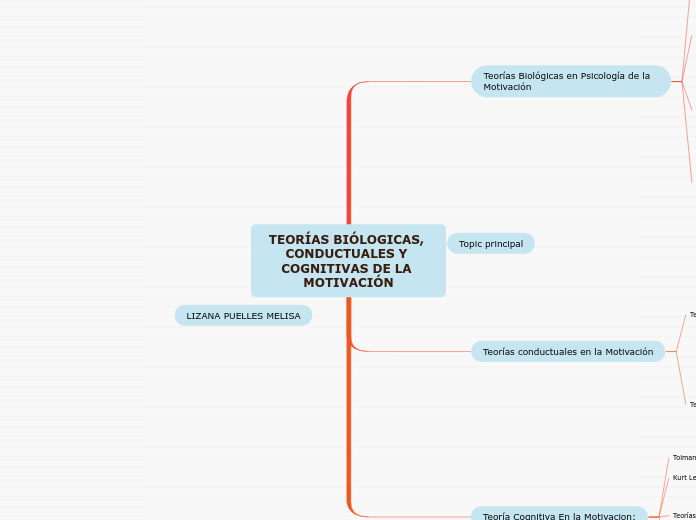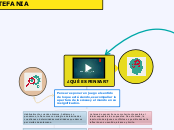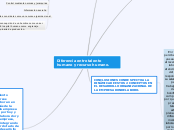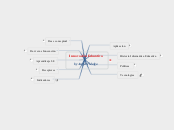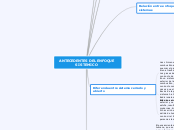LIZANA PUELLES MELISA
TEORÍAS BIÓLOGICAS, CONDUCTUALES Y COGNITIVAS DE LA MOTIVACIÓN
To name your story, you have to think about the overall message and what you want your audience to understand from the story. Also, make it relevant and easy to remember.
Teoría Cognitiva En la Motivacion:
The ending of a story is essential. We all know that if the ending is weak, what happened before loses its importance. So make it unpredictable, but fair. A resolved ending answers all the questions and ties up any loose threads from the plot.
Teorías de Motivo de Logro-Valor/Expectativa
Murray
motivo de logro es universal
a partir de las necesidades
Teorías de Expectativa-Valor
importancia que dichas consecuencias puedan tener para la persona
Try answering these questions in order for you to come up with a closure:
- Have all problems been solved?
- Is it clear what happens with all your characters in the story?
- Has the challenged transformed your main character?
- How do the characters feel in the end?
consecuencias, positivas y/o negativas de las acciones
Kurt Lewin
This is the closure section of the story.
See examples of possible outcomes below:
- all problems have been solved
- it's clear how each one of your characters ends up
- your main character is transformed by the challenge
motivación en la conducta
: explica desde planteamientos homeostáticos
Try answering these questions to come up with a closure:
- Have all the problems been solved?
- Is there a clear picture of what happens with each character in the story?
- Has the challenge transformed your main character?
- How do the characters feel in the end?
Tolman
This is the moment when the main character surpasses the last obstacle and finally faces their greatest challenge.
The climax usually follows one of these patterns:
- realization
- resolution
- choice
Type in your answer.
importancia de las metas
Teorías conductuales en la Motivación
The middle of the story is where you add layers of complications that will lead to the end. Reveal more about the character's journey. Did their personality go through changes? How did they overcome the challenges? And as you build up the story’s central conflict, make it more personal to that character. Also, from the middle act, you have to lead into the final act.
Teorías del Aprendizaje
There wouldn't be any tension and excitement in your story if there weren't any obstacles in your character's way.
Aproximaciones desde el condicionamiento operante
Thorndike, con su ley del efecto
aprendizaje de una respuesta dependerá de las consecuencias contingentes a la misma
Castigo
Reforzador
Aportaciones desde el condicionamiento clásico
A story is nothing more than a character overcoming a series of difficulties to reach the desired goal. Obstacles usually create suspense and conflict. In overcoming obstacles, there is growth: weak becomes strong; hatred turns into love; sadness into happiness; wrong into right; lies into truth; or evil becomes good.
See a few examples below:
- stopping a meteor
- finding a killer
- finding love
reflejos innatos pueden ser elicitados por estímulos
Teorías del impulso
Each story has a main character and that character usually needs to solve a problem or challenge. The character's challenge is the one that creates tension throughout the story.
Aportaciones de Hull y Spence
Type in any other challenges which other characters in the story need to face.
influida por
Mecanicismo E-R de Watson
concepto de homeostasis de Walter Cannon
Evolucionismo de Darwin
Aportación de Woodworth
hol
In most stories, there are 3 challenges. The number 3 is a mystical number symbolizing completeness. Try to come up with interesting challenges with which your character needs to struggle.
See a few examples below:
- turns into a werewolf at night
- is sent back in time
La persistencia
La dirección
La intensidad
Topic principal
Teorías Biológicas en Psicología de la Motivación
In the beginning of the story (or the exposition), you will need to introduce the setting and characters. You might also want to introduce the main conflict. This part of the story is important because it gives the reader necessary background information and maybe even a first insight into a character’s personality.
Teoría Interaccionista
John Hughlings -Jackson
tres grandes niveles
corteza frontal.
corteza motora
ganglios basales
médula espinal
Teoría de la activación
PRINCIPIOS:
localización y conocimiento de mecanismos del organismo que controlan las conductas motivadas
Trabajos que tratan de descubrir estructuras fisiológicas que participan en la activación
Trabajos centrados en relación entre activación y rendimiento
Teorías Instintivistas
The setting (time & place) of a story can change throughout the plot.
McDougall
The time of the story can also change. It can describe the event of a single day or can include an entire year's plot. Anyway, don't forget to mention it.
instinto está conformado: tres componentes
cognitivo, el afectivo y conativo
instinto
disposición psicológica innata o heredada
James
Your story can take place wherever your imagination will take you to.
For example: in an elevator, in an enchanted forest, etc. Don't forget to give details of the environment each time the setting changes, otherwise, the story can be confusing. Also, mention the seasons as each of them has unique weather and events.
dos grandes principios
hábito (aprendizaje)
algunos instintos son transitorios
instinto considerado como impulso
Teorías Evolucionistas
Characters are essential to a good story. Usually, the protagonist(s) is/are the most affected by the plot. Introduce a character by focusing on their actions, interests, and occupation, as the physical appearance doesn't make a difference in most cases.
están
Type in the name of your character.
Main Goal
What is your character's main goal?
fight Evilfind lovedefeat his/her enemyrule the worldmake friendstime travelmake an awesome discoveryOther
lamarckismo
Which traits best describe the character's personality? Choose more if necessary:
introvertedloyalkindindependentquick-thinkingadventuresomeidealisticsweet-naturedcalmrisk-takercreativewittystrictfussyweirdclumsyharshaggressivecarelessclingingcowardlycrueldeceitfulimpulsiveOther
Jean Baptiste de Monet
Ley del uso y del desuso
creacionismo
Choose the type of your chacter:
Protagonist (main character)Antagonist (main character's opponent)Flat (stereotypical character)Round (his/ her personality develops throughout the story)Static (doesn't evolve as a person throughout the story)Dynamic (dramatical change in personality)Confidant (the main character trusts him/ her)Foil (contrasting character who enhances the personality of another character)Other
origen de las especies explicado: intervención divina
